
use-stick-to-bottom
A lightweight React Hook intended mainly for AI chat applications, for smoothly sticking to bottom of messages
Stars: 221
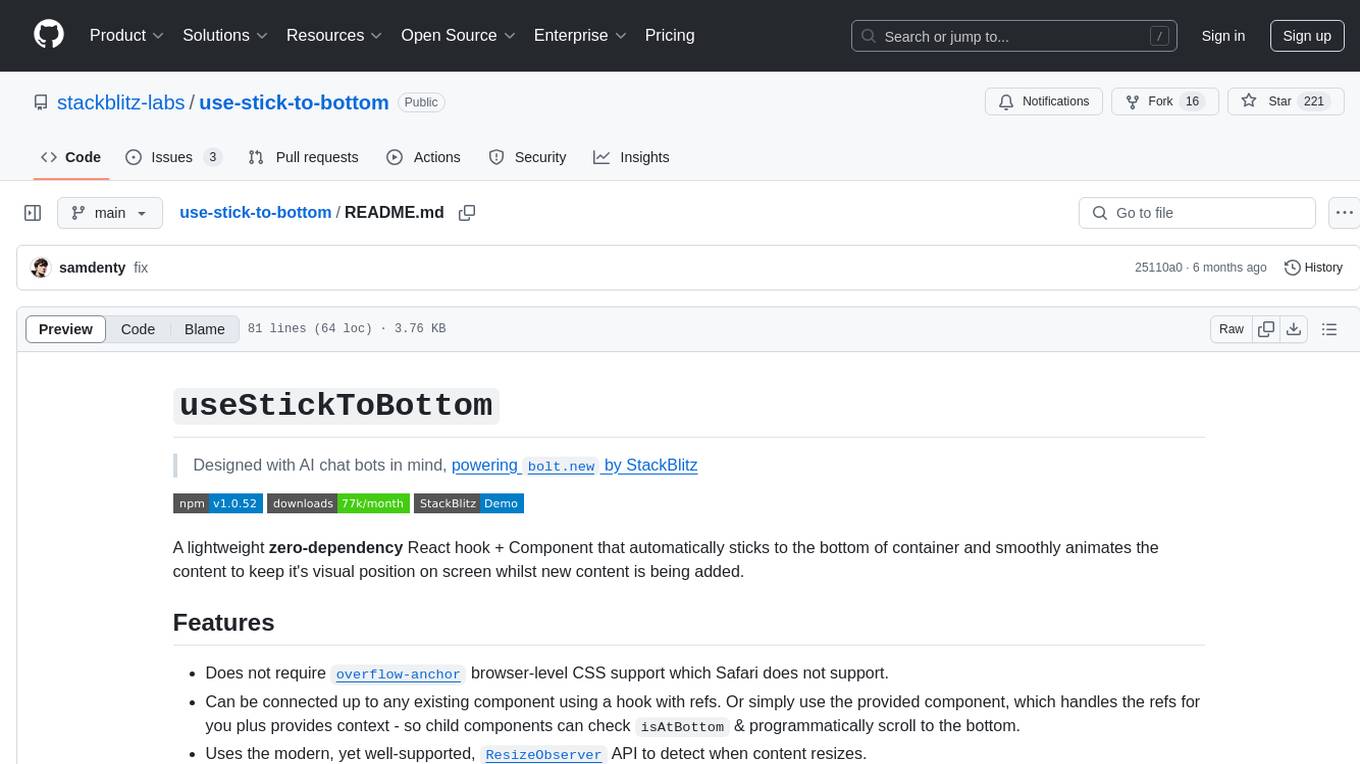
A lightweight zero-dependency React hook + Component that automatically sticks to the bottom of container and smoothly animates the content to keep its visual position on screen whilst new content is being added. It does not require overflow-anchor browser-level CSS support, can be connected to any existing component using a hook with refs, uses ResizeObserver API to detect content resizing, supports content shrinking without losing stickiness, correctly handles Scroll Anchoring, allows user to cancel stickiness by scrolling up, distinguishes user scrolling from custom animation scroll events, works well on mobile devices, uses a custom smooth scrolling algorithm with velocity-based spring animations, and provides a Promise-based scrollToBottom function.
README:
Designed with AI chat bots in mind, powering
bolt.newby StackBlitz
A lightweight zero-dependency React hook + Component that automatically sticks to the bottom of container and smoothly animates the content to keep it's visual position on screen whilst new content is being added.
- Does not require
overflow-anchorbrowser-level CSS support which Safari does not support. - Can be connected up to any existing component using a hook with refs. Or simply use the provided component, which handles the refs for you plus provides context - so child components can check
isAtBottom& programmatically scroll to the bottom. - Uses the modern, yet well-supported,
ResizeObserverAPI to detect when content resizes.- Supports content shrinking without losing stickiness - not just getting taller.
- Correctly handles Scroll Anchoring. This is where when content above the viewport resizes, it doesn't cause the content currently displayed in viewport to jump up or down.
- Allows the user to cancel the stickiness at any time by scrolling up.
- Clever logic distinguishes the user scrolling from the custom animation scroll events (without doing any debouncing which could cause some events to be missed).
- Mobile devices work well with this logic too.
- Uses a custom implemented smooth scrolling algorithm, featuring velocity-based spring animations (with configurable parameters).
- Other libraries use easing functions with durations instead, but these doesn't work well when you want to stream in new content with variable sizing - which is common for AI chatbot use cases.
-
scrollToBottomreturns aPromise<boolean>which will resolve totrueas soon as the scroll was successful, orfalseif the scroll was cancelled.
import { StickToBottom, useStickToBottomContext } from 'use-stick-to-bottom';
function Chat() {
return (
<StickToBottom className="h-[50vh] relative" resize="smooth" initial="smooth">
<StickToBottom.Content className="flex flex-col gap-4">
{messages.map((message) => (
<Message key={message.id} message={message} />
))}
</StickToBottom.Content>
<ScrollToBottom />
{/* This component uses `useStickToBottomContext` to scroll to bottom when the user enters a message */}
<ChatBox />
</StickToBottom>
);
}
function ScrollToBottom() {
const { isAtBottom, scrollToBottom } = useStickToBottomContext();
return (
!isAtBottom && (
<button
className="absolute i-ph-arrow-circle-down-fill text-4xl rounded-lg left-[50%] translate-x-[-50%] bottom-0"
onClick={() => scrollToBottom()}
/>
)
);
}import { useStickToBottom } from 'use-stick-to-bottom';
function Component() {
const { scrollRef, contentRef } = useStickToBottom();
return (
<div style={{ overflow: 'auto' }} ref={scrollRef}>
<div ref={contentRef}>
{messages.map((message) => (
<Message key={message.id} message={message} />
))}
</div>
</div>
);
}For Tasks:
Click tags to check more tools for each tasksFor Jobs:
Alternative AI tools for use-stick-to-bottom
Similar Open Source Tools

use-stick-to-bottom
A lightweight zero-dependency React hook + Component that automatically sticks to the bottom of container and smoothly animates the content to keep its visual position on screen whilst new content is being added. It does not require overflow-anchor browser-level CSS support, can be connected to any existing component using a hook with refs, uses ResizeObserver API to detect content resizing, supports content shrinking without losing stickiness, correctly handles Scroll Anchoring, allows user to cancel stickiness by scrolling up, distinguishes user scrolling from custom animation scroll events, works well on mobile devices, uses a custom smooth scrolling algorithm with velocity-based spring animations, and provides a Promise-based scrollToBottom function.

web-llm
WebLLM is a modular and customizable javascript package that directly brings language model chats directly onto web browsers with hardware acceleration. Everything runs inside the browser with no server support and is accelerated with WebGPU. WebLLM is fully compatible with OpenAI API. That is, you can use the same OpenAI API on any open source models locally, with functionalities including json-mode, function-calling, streaming, etc. We can bring a lot of fun opportunities to build AI assistants for everyone and enable privacy while enjoying GPU acceleration.
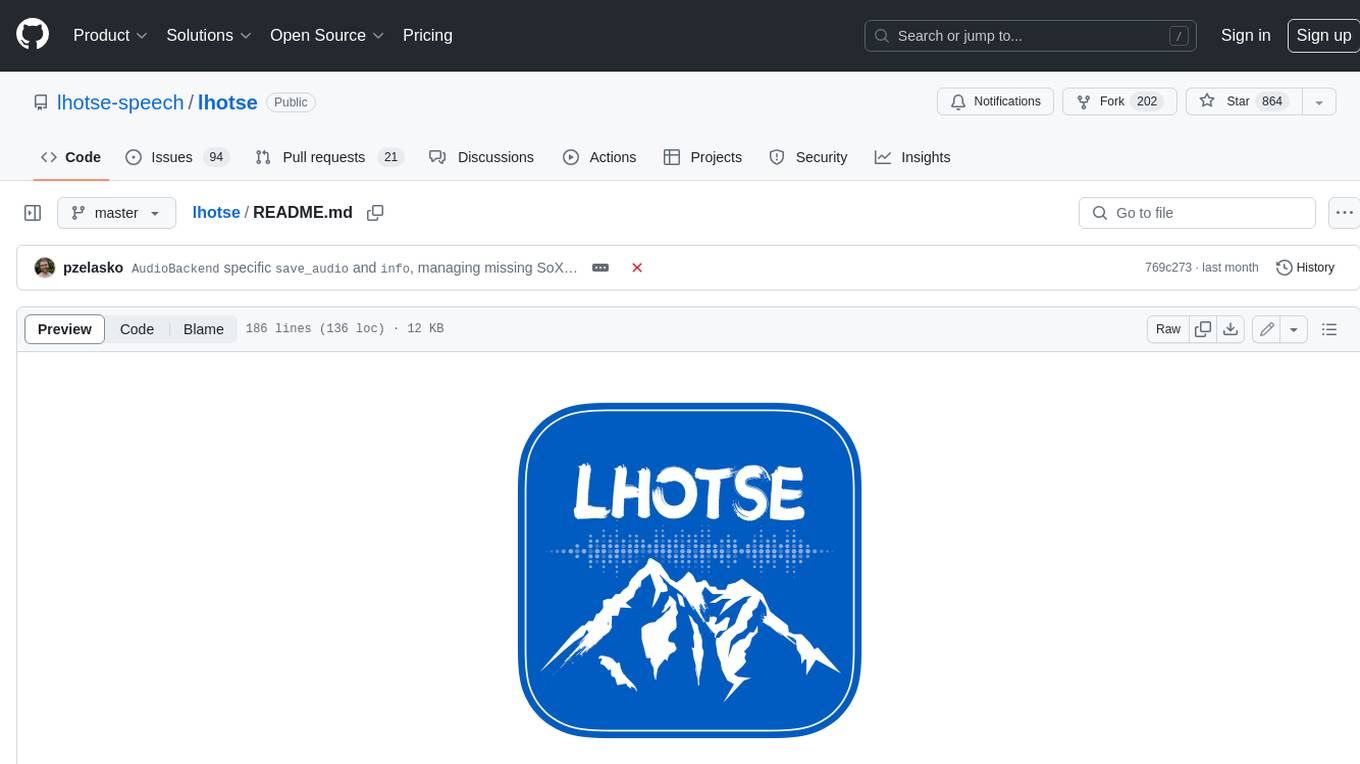
lhotse
Lhotse is a Python library designed to make speech and audio data preparation flexible and accessible. It aims to attract a wider community to speech processing tasks by providing a Python-centric design and an expressive command-line interface. Lhotse offers standard data preparation recipes, PyTorch Dataset classes for speech tasks, and efficient data preparation for model training with audio cuts. It supports data augmentation, feature extraction, and feature-space cut mixing. The tool extends Kaldi's data preparation recipes with seamless PyTorch integration, human-readable text manifests, and convenient Python classes.
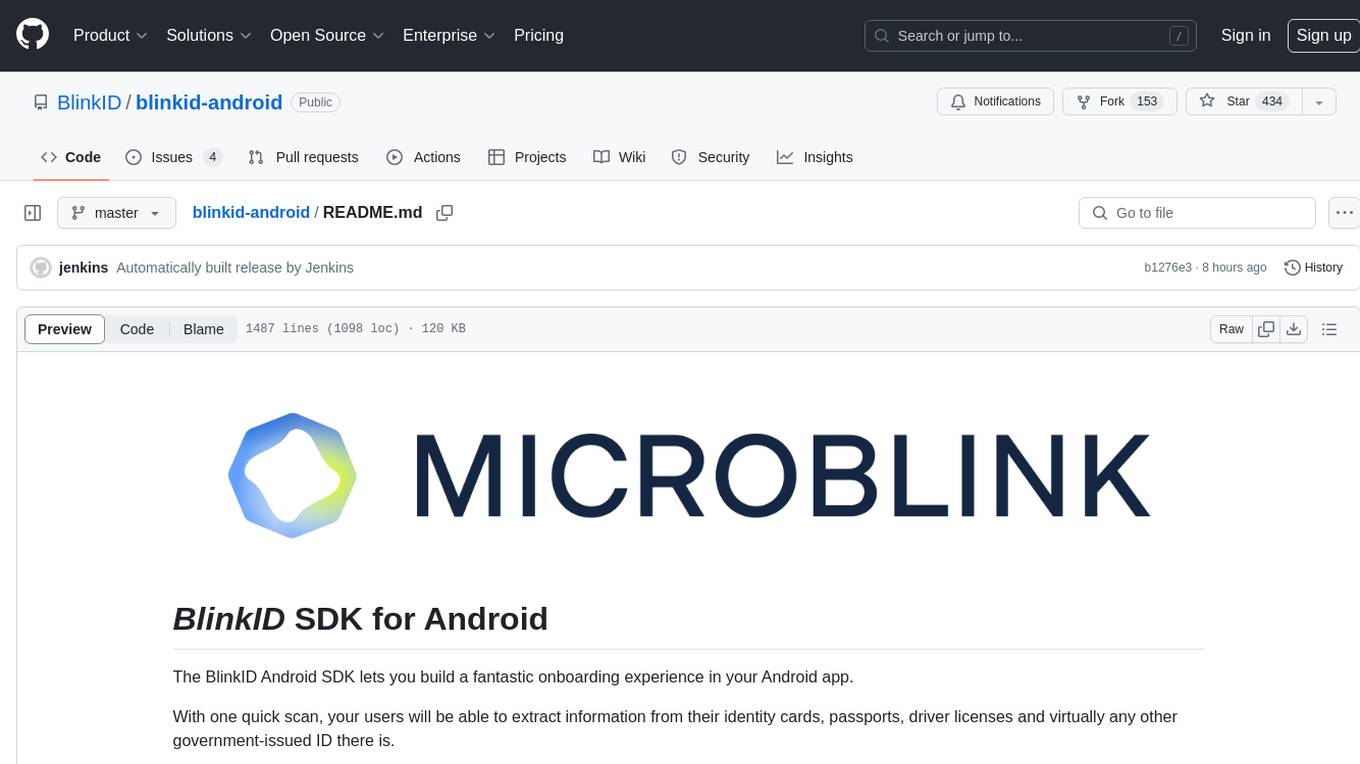
blinkid-android
The BlinkID Android SDK is a comprehensive solution for implementing secure document scanning and extraction. It offers powerful capabilities for extracting data from a wide range of identification documents. The SDK provides features for integrating document scanning into Android apps, including camera requirements, SDK resource pre-bundling, customizing the UX, changing default strings and localization, troubleshooting integration difficulties, and using the SDK through various methods. It also offers options for completely custom UX with low-level API integration. The SDK size is optimized for different processor architectures, and API documentation is available for reference. For any questions or support, users can contact the Microblink team at help.microblink.com.
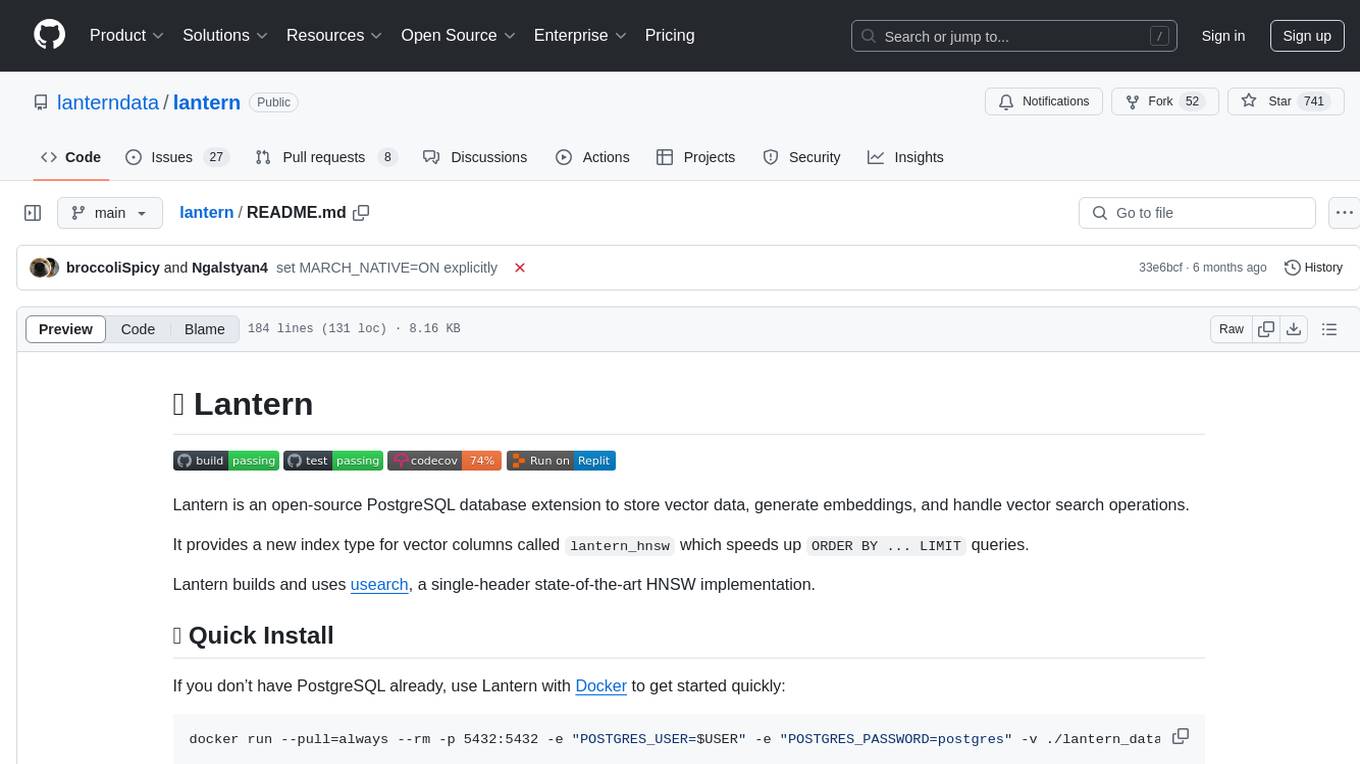
lantern
Lantern is an open-source PostgreSQL database extension designed to store vector data, generate embeddings, and handle vector search operations efficiently. It introduces a new index type called 'lantern_hnsw' for vector columns, which speeds up 'ORDER BY ... LIMIT' queries. Lantern utilizes the state-of-the-art HNSW implementation called usearch. Users can easily install Lantern using Docker, Homebrew, or precompiled binaries. The tool supports various distance functions, index construction parameters, and operator classes for efficient querying. Lantern offers features like embedding generation, interoperability with pgvector, parallel index creation, and external index graph generation. It aims to provide superior performance metrics compared to other similar tools and has a roadmap for future enhancements such as cloud-hosted version, hardware-accelerated distance metrics, industry-specific application templates, and support for version control and A/B testing of embeddings.
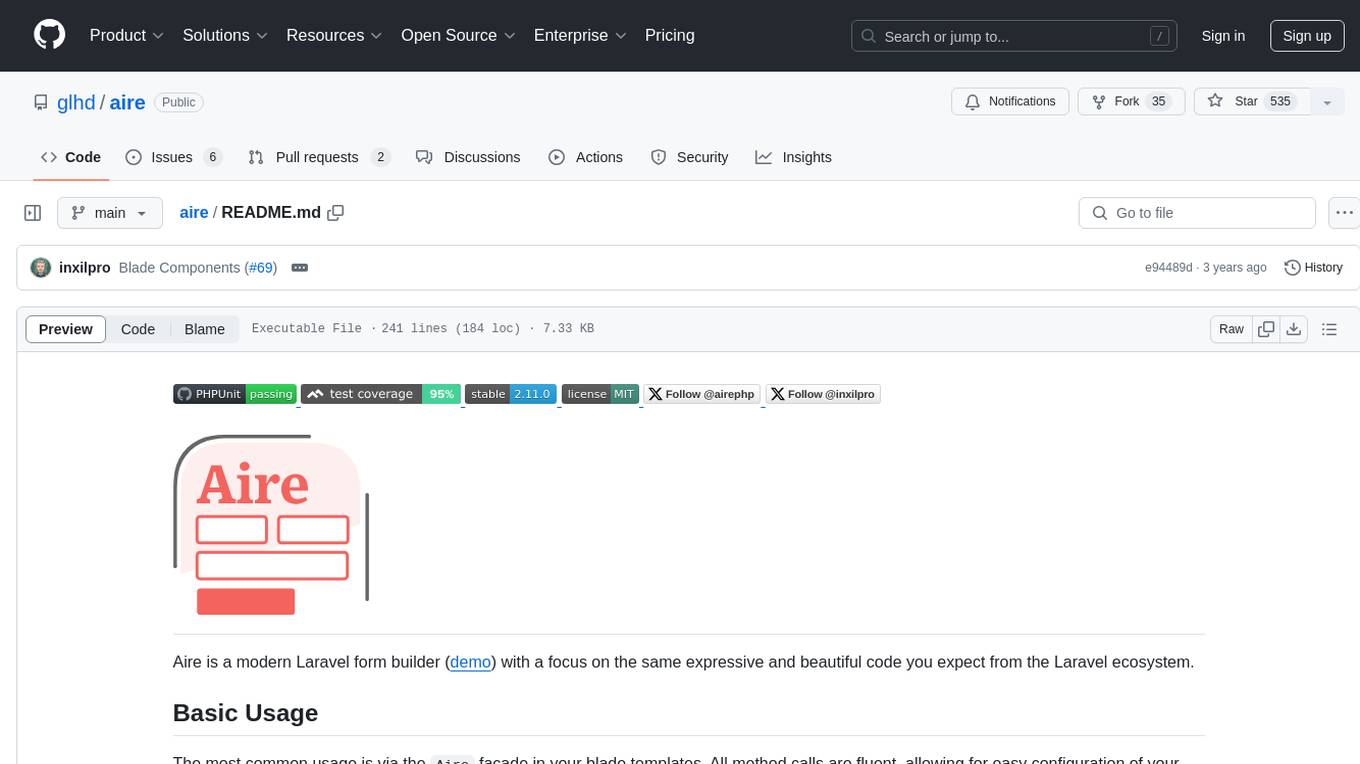
aire
Aire is a modern Laravel form builder with a focus on expressive and beautiful code. It allows easy configuration of form components using fluent method calls or Blade components. Aire supports customization through config files and custom views, data binding with Eloquent models or arrays, method spoofing, CSRF token injection, server-side and client-side validation, and translations. It is designed to run on Laravel 5.8.28 and higher, with support for PHP 7.1 and higher. Aire is actively maintained and under consideration for additional features like read-only plain text, cross-browser support for custom checkboxes and radio buttons, support for Choices.js or similar libraries, improved file input handling, and better support for content prepending or appending to inputs.
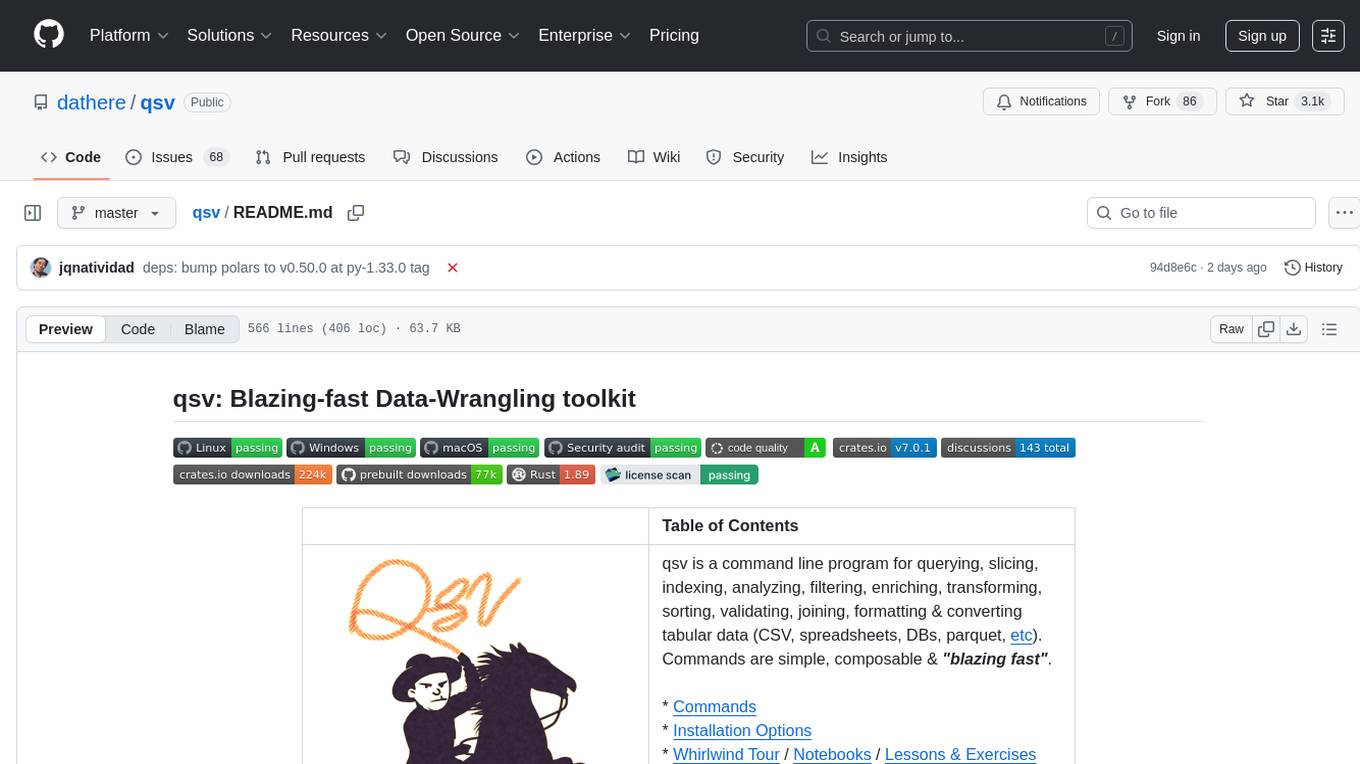
qsv
qsv is a command line program for querying, slicing, indexing, analyzing, filtering, enriching, transforming, sorting, validating, joining, formatting & converting tabular data (CSV, spreadsheets, DBs, parquet, etc). Commands are simple, composable & 'blazing fast'. It is a blazing-fast data-wrangling toolkit with a focus on speed, processing very large files, and being a complete data-wrangling toolkit. It is designed to be portable, easy to use, secure, and easy to contribute to. qsv follows the RFC 4180 CSV standard, requires UTF-8 encoding, and supports various file formats. It has extensive shell completion support, automatic compression/decompression using Snappy, and supports environment variables and dotenv files. qsv has a comprehensive test suite and is dual-licensed under MIT or the UNLICENSE.
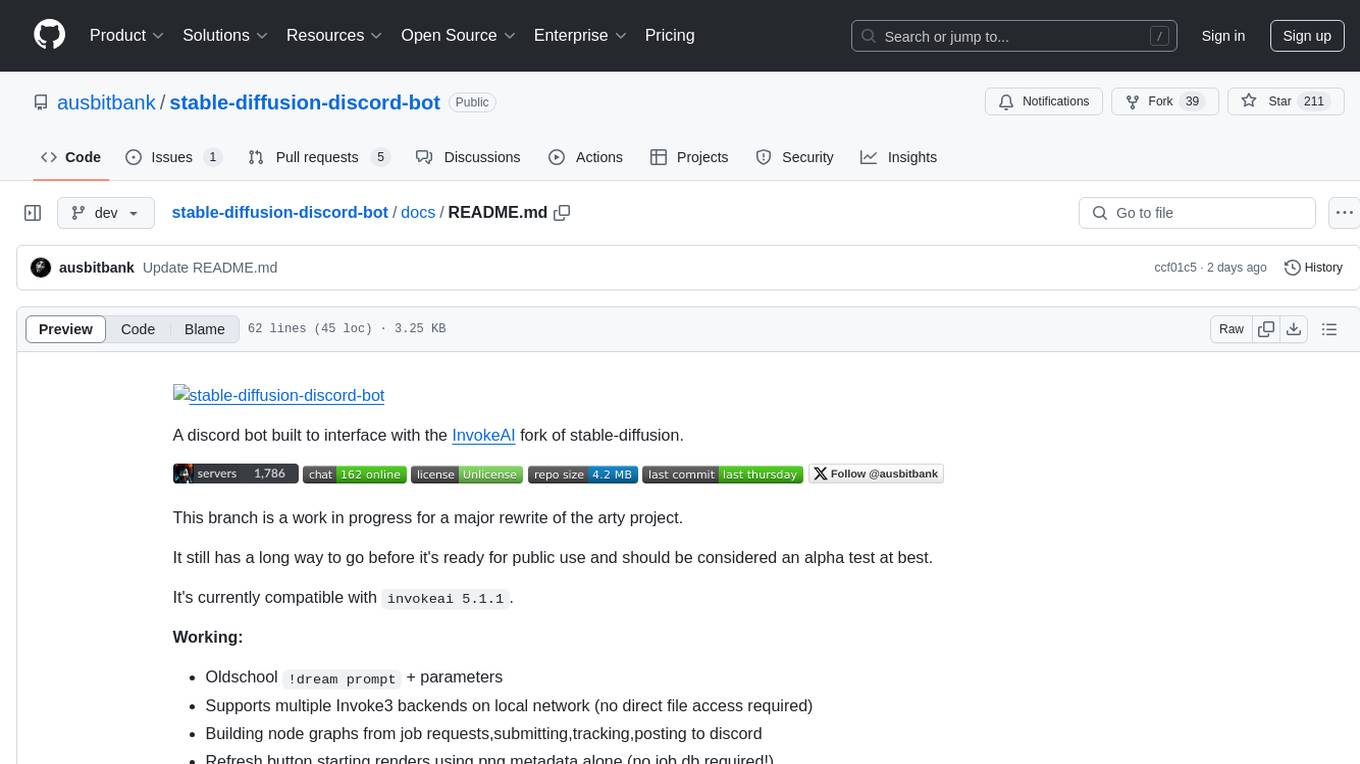
stable-diffusion-discord-bot
A discord bot built to interface with the InvokeAI fork of stable-diffusion. It is a work in progress for a major rewrite of the arty project, compatible with `invokeai 5.1.1`. The bot supports various functionalities like building node graphs from job requests, refreshing renders using png metadata, removing backgrounds, job progress tracking, and LLM integration. Users can install custom invokeai nodes for advanced functionality and launch the bot natively or with docker. Patches and pull requests are welcomed.
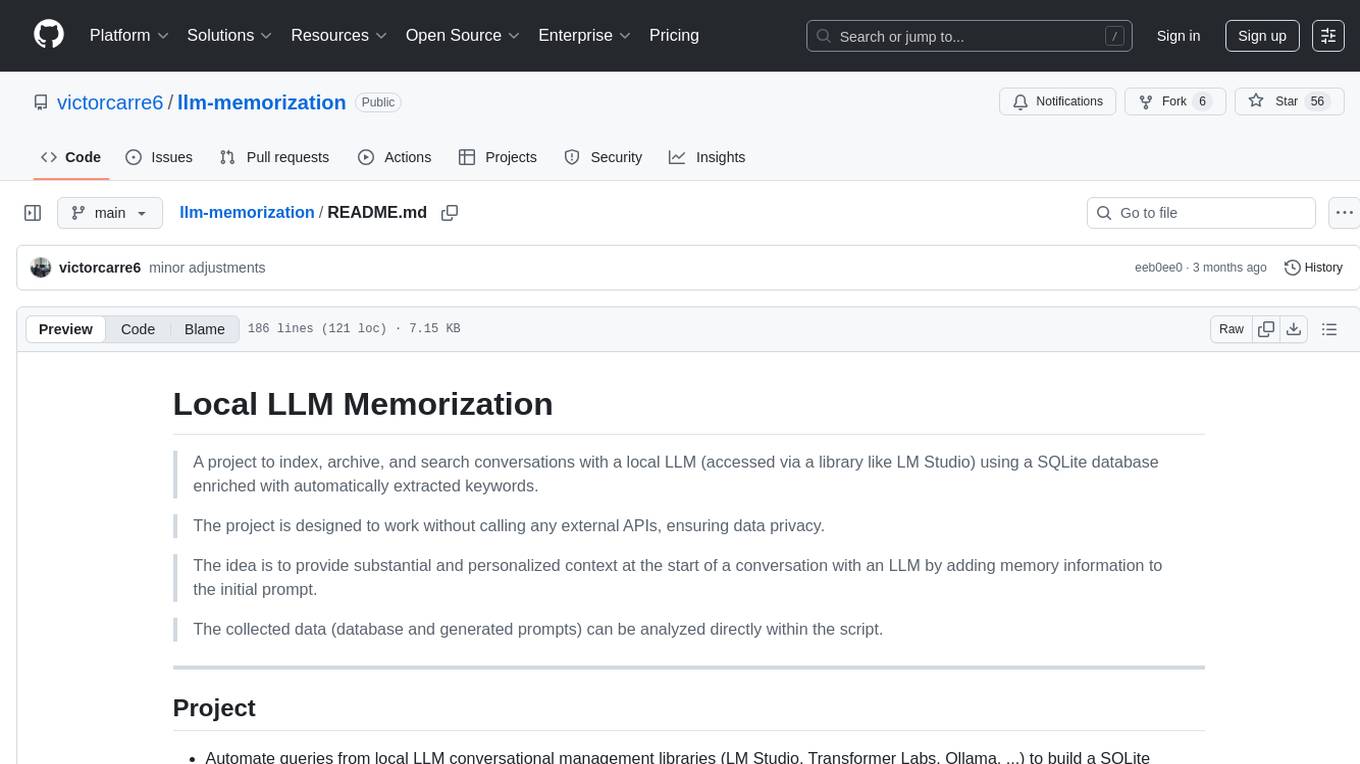
llm-memorization
The 'llm-memorization' project is a tool designed to index, archive, and search conversations with a local LLM using a SQLite database enriched with automatically extracted keywords. It aims to provide personalized context at the start of a conversation by adding memory information to the initial prompt. The tool automates queries from local LLM conversational management libraries, offers a hybrid search function, enhances prompts based on posed questions, and provides an all-in-one graphical user interface for data visualization. It supports both French and English conversations and prompts for bilingual use.
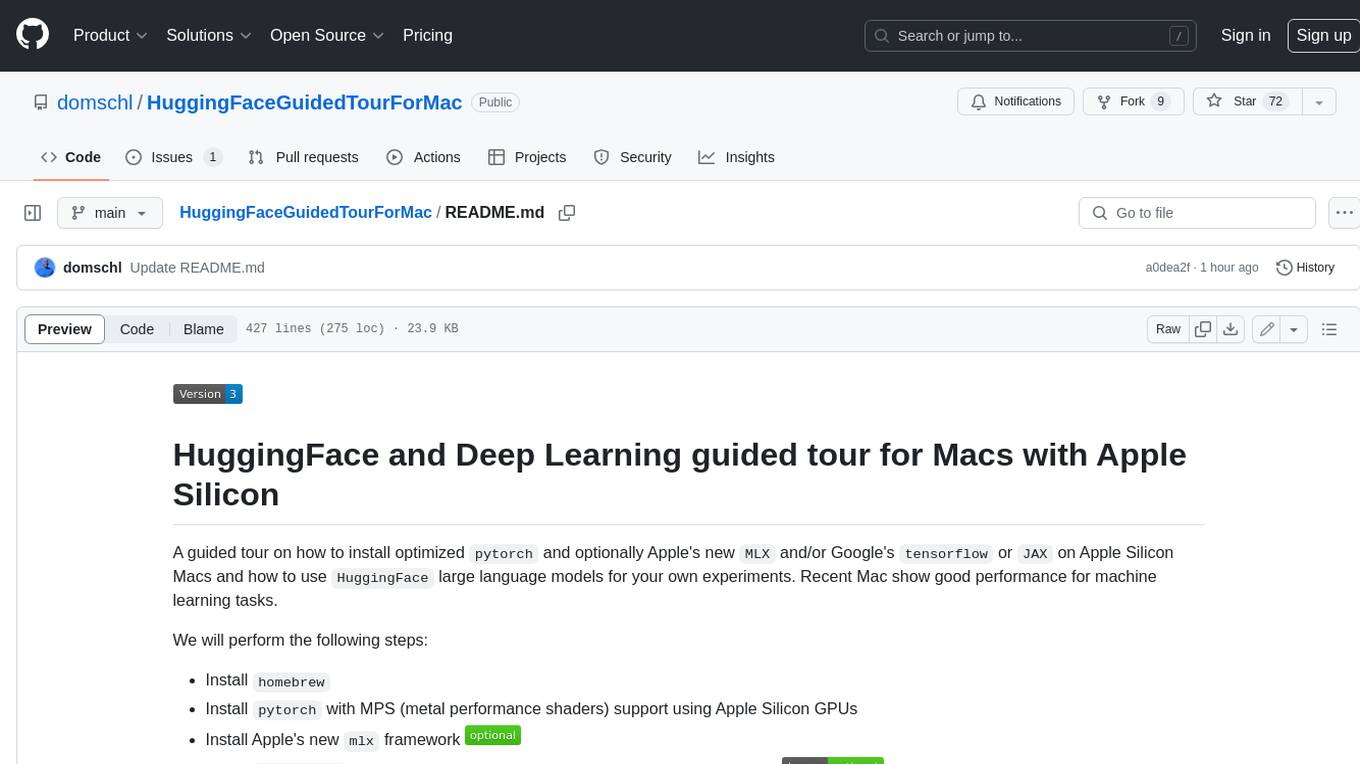
HuggingFaceGuidedTourForMac
HuggingFaceGuidedTourForMac is a guided tour on how to install optimized pytorch and optionally Apple's new MLX, JAX, and TensorFlow on Apple Silicon Macs. The repository provides steps to install homebrew, pytorch with MPS support, MLX, JAX, TensorFlow, and Jupyter lab. It also includes instructions on running large language models using HuggingFace transformers. The repository aims to help users set up their Macs for deep learning experiments with optimized performance.
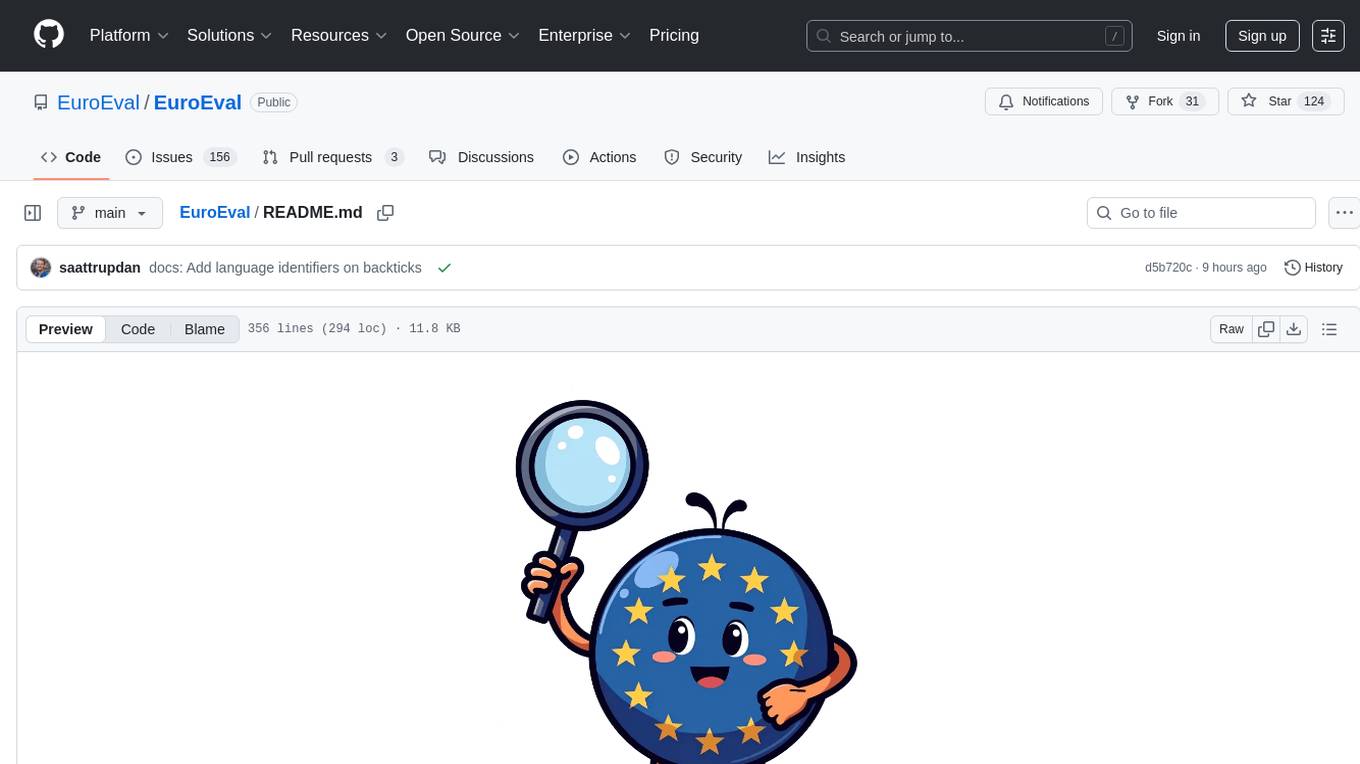
EuroEval
EuroEval is a robust European language model benchmark tool, formerly known as ScandEval. It provides a platform to benchmark pretrained models on various tasks across different languages. Users can evaluate models, datasets, and metrics both online and offline. The tool supports benchmarking from the command line, script, and Docker. Additionally, users can reproduce datasets used in the project using provided scripts. EuroEval welcomes contributions and offers guidelines for general contributions and adding new datasets.
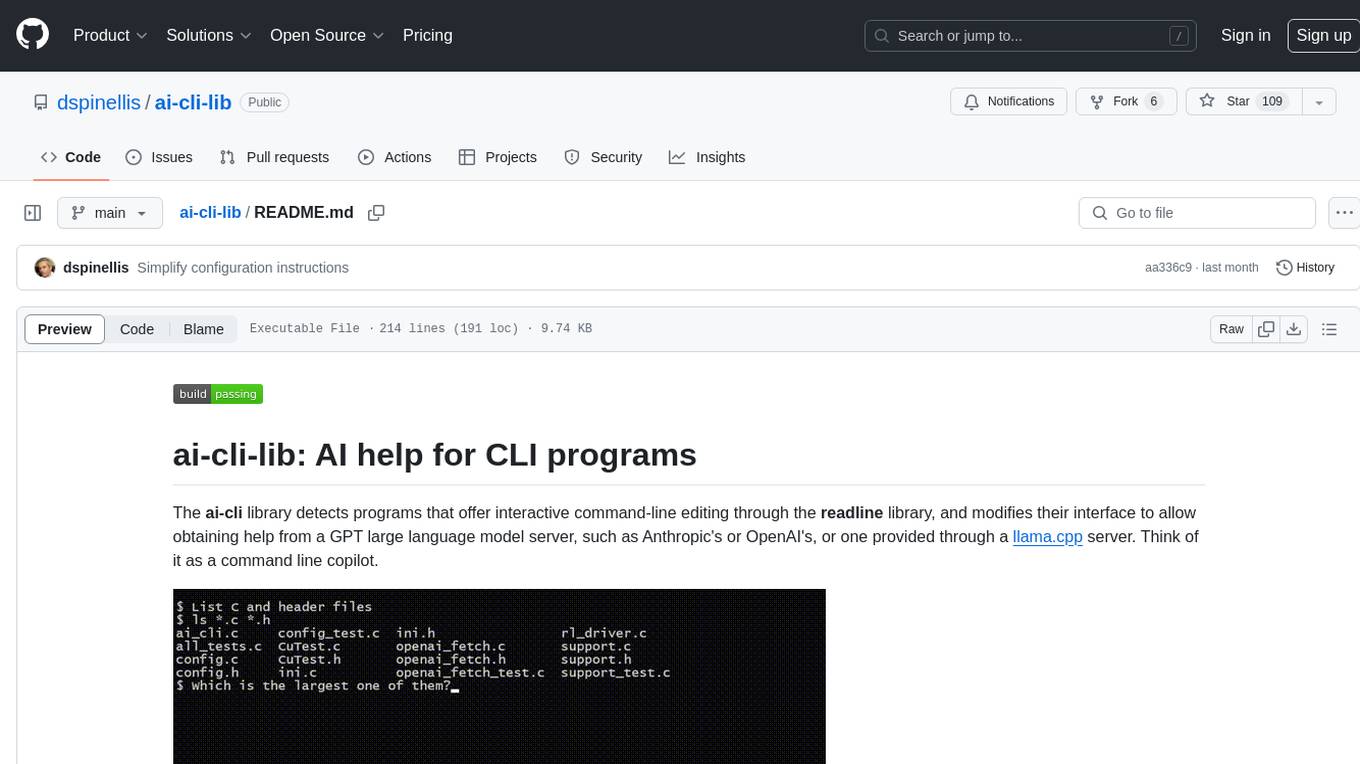
ai-cli-lib
The ai-cli-lib is a library designed to enhance interactive command-line editing programs by integrating with GPT large language model servers. It allows users to obtain AI help from servers like Anthropic's or OpenAI's, or a llama.cpp server. The library acts as a command line copilot, providing natural language prompts and responses to enhance user experience and productivity. It supports various platforms such as Debian GNU/Linux, macOS, and Cygwin, and requires specific packages for installation and operation. Users can configure the library to activate during shell startup and interact with command-line programs like bash, mysql, psql, gdb, sqlite3, and bc. Additionally, the library provides options for configuring API keys, setting up llama.cpp servers, and ensuring data privacy by managing context settings.
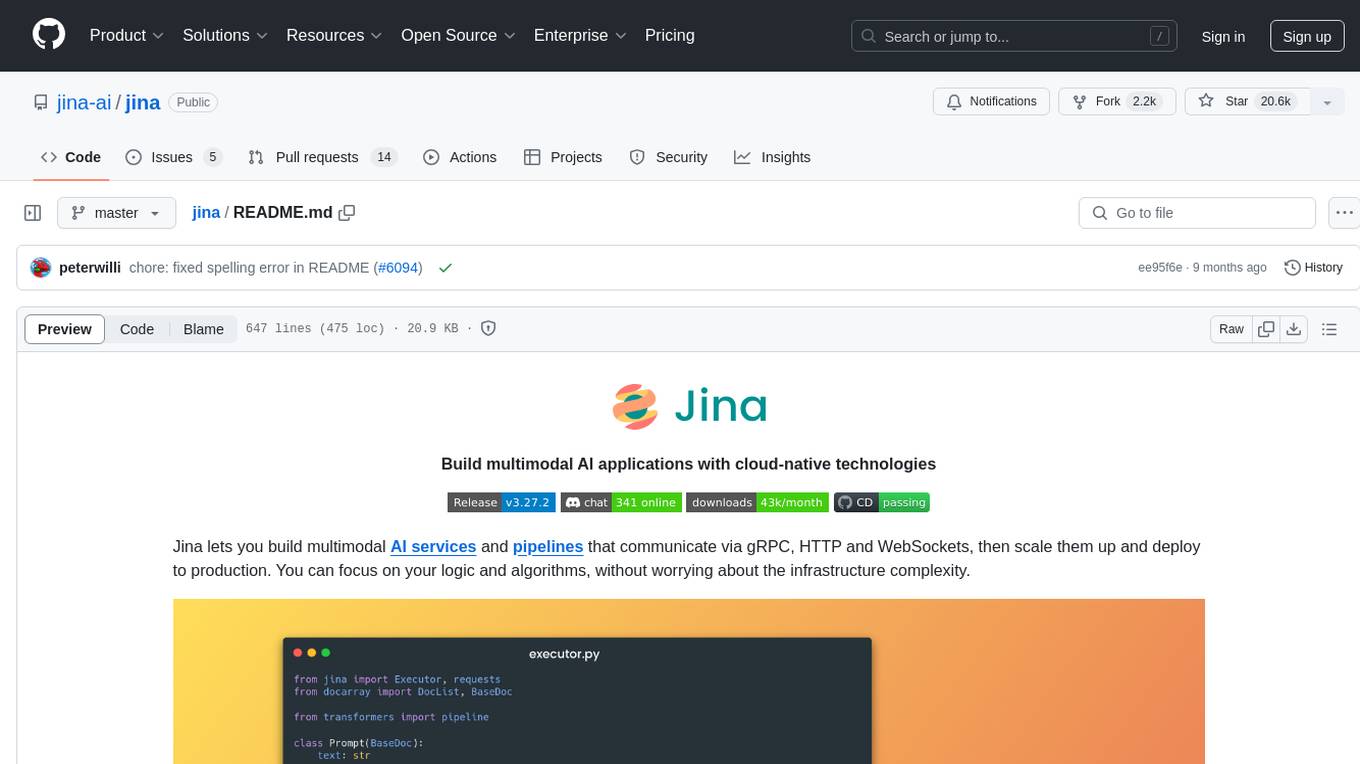
jina
Jina is a tool that allows users to build multimodal AI services and pipelines using cloud-native technologies. It provides a Pythonic experience for serving ML models and transitioning from local deployment to advanced orchestration frameworks like Docker-Compose, Kubernetes, or Jina AI Cloud. Users can build and serve models for any data type and deep learning framework, design high-performance services with easy scaling, serve LLM models while streaming their output, integrate with Docker containers via Executor Hub, and host on CPU/GPU using Jina AI Cloud. Jina also offers advanced orchestration and scaling capabilities, a smooth transition to the cloud, and easy scalability and concurrency features for applications. Users can deploy to their own cloud or system with Kubernetes and Docker Compose integration, and even deploy to JCloud for autoscaling and monitoring.

torchchat
torchchat is a codebase showcasing the ability to run large language models (LLMs) seamlessly. It allows running LLMs using Python in various environments such as desktop, server, iOS, and Android. The tool supports running models via PyTorch, chatting, generating text, running chat in the browser, and running models on desktop/server without Python. It also provides features like AOT Inductor for faster execution, running in C++ using the runner, and deploying and running on iOS and Android. The tool supports popular hardware and OS including Linux, Mac OS, Android, and iOS, with various data types and execution modes available.
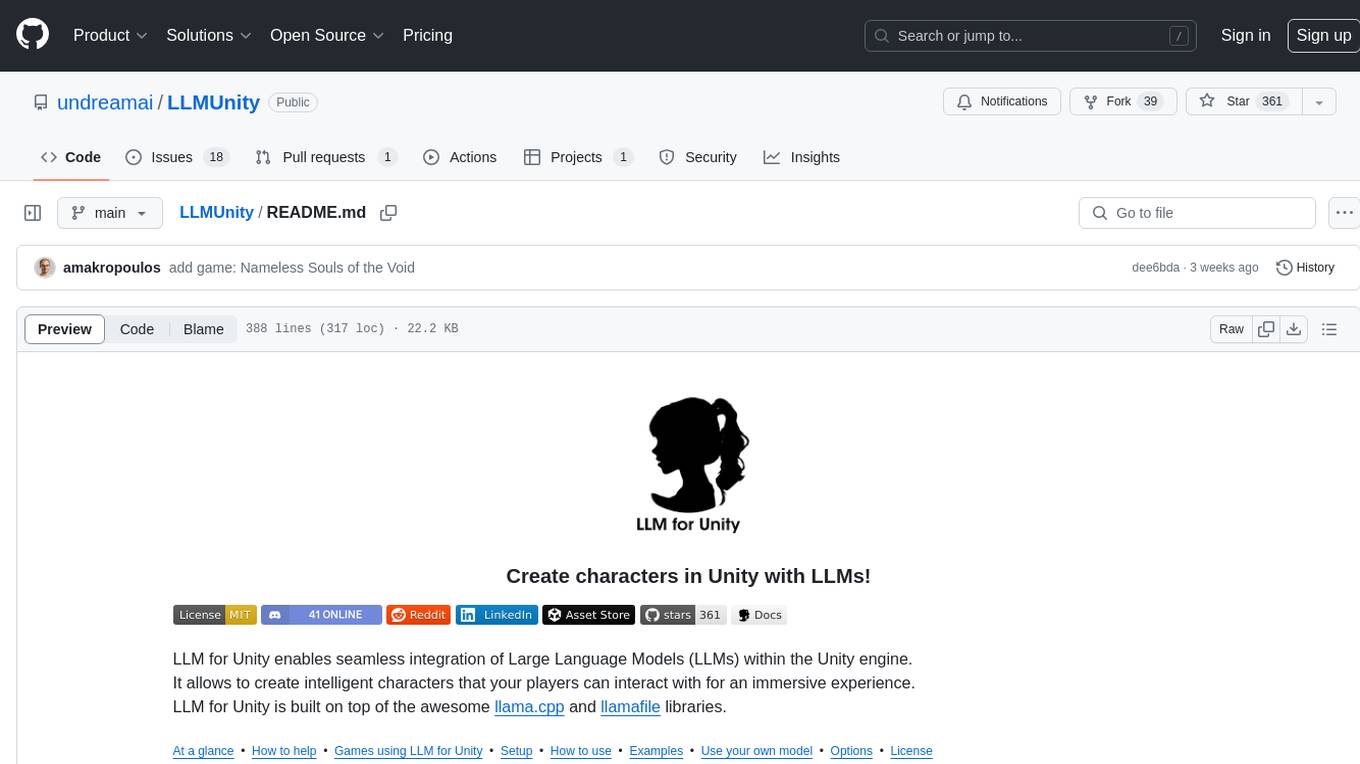
LLMUnity
LLM for Unity enables seamless integration of Large Language Models (LLMs) within the Unity engine, allowing users to create intelligent characters for immersive player interactions. The tool supports major LLM models, runs locally without internet access, offers fast inference on CPU and GPU, and is easy to set up with a single line of code. It is free for both personal and commercial use, tested on Unity 2021 LTS, 2022 LTS, and 2023. Users can build multiple AI characters efficiently, use remote servers for processing, and customize model settings for text generation.
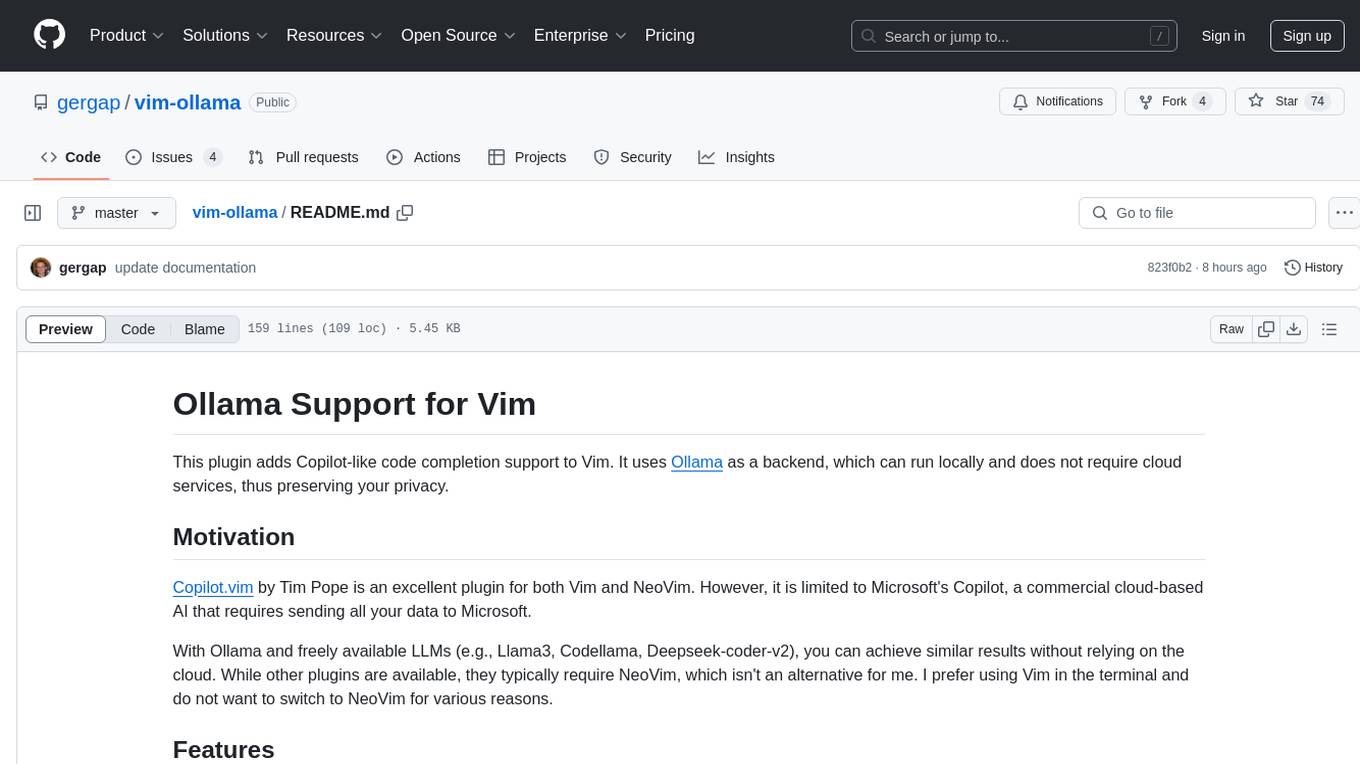
vim-ollama
The 'vim-ollama' plugin for Vim adds Copilot-like code completion support using Ollama as a backend, enabling intelligent AI-based code completion and integrated chat support for code reviews. It does not rely on cloud services, preserving user privacy. The plugin communicates with Ollama via Python scripts for code completion and interactive chat, supporting Vim only. Users can configure LLM models for code completion tasks and interactive conversations, with detailed installation and usage instructions provided in the README.
For similar tasks

use-stick-to-bottom
A lightweight zero-dependency React hook + Component that automatically sticks to the bottom of container and smoothly animates the content to keep its visual position on screen whilst new content is being added. It does not require overflow-anchor browser-level CSS support, can be connected to any existing component using a hook with refs, uses ResizeObserver API to detect content resizing, supports content shrinking without losing stickiness, correctly handles Scroll Anchoring, allows user to cancel stickiness by scrolling up, distinguishes user scrolling from custom animation scroll events, works well on mobile devices, uses a custom smooth scrolling algorithm with velocity-based spring animations, and provides a Promise-based scrollToBottom function.
For similar jobs

ChatFAQ
ChatFAQ is an open-source comprehensive platform for creating a wide variety of chatbots: generic ones, business-trained, or even capable of redirecting requests to human operators. It includes a specialized NLP/NLG engine based on a RAG architecture and customized chat widgets, ensuring a tailored experience for users and avoiding vendor lock-in.

agentcloud
AgentCloud is an open-source platform that enables companies to build and deploy private LLM chat apps, empowering teams to securely interact with their data. It comprises three main components: Agent Backend, Webapp, and Vector Proxy. To run this project locally, clone the repository, install Docker, and start the services. The project is licensed under the GNU Affero General Public License, version 3 only. Contributions and feedback are welcome from the community.

anything-llm
AnythingLLM is a full-stack application that enables you to turn any document, resource, or piece of content into context that any LLM can use as references during chatting. This application allows you to pick and choose which LLM or Vector Database you want to use as well as supporting multi-user management and permissions.

ai-guide
This guide is dedicated to Large Language Models (LLMs) that you can run on your home computer. It assumes your PC is a lower-end, non-gaming setup.

Magick
Magick is a groundbreaking visual AIDE (Artificial Intelligence Development Environment) for no-code data pipelines and multimodal agents. Magick can connect to other services and comes with nodes and templates well-suited for intelligent agents, chatbots, complex reasoning systems and realistic characters.

glide
Glide is a cloud-native LLM gateway that provides a unified REST API for accessing various large language models (LLMs) from different providers. It handles LLMOps tasks such as model failover, caching, key management, and more, making it easy to integrate LLMs into applications. Glide supports popular LLM providers like OpenAI, Anthropic, Azure OpenAI, AWS Bedrock (Titan), Cohere, Google Gemini, OctoML, and Ollama. It offers high availability, performance, and observability, and provides SDKs for Python and NodeJS to simplify integration.

chatbot-ui
Chatbot UI is an open-source AI chat app that allows users to create and deploy their own AI chatbots. It is easy to use and can be customized to fit any need. Chatbot UI is perfect for businesses, developers, and anyone who wants to create a chatbot.

onnxruntime-genai
ONNX Runtime Generative AI is a library that provides the generative AI loop for ONNX models, including inference with ONNX Runtime, logits processing, search and sampling, and KV cache management. Users can call a high level `generate()` method, or run each iteration of the model in a loop. It supports greedy/beam search and TopP, TopK sampling to generate token sequences, has built in logits processing like repetition penalties, and allows for easy custom scoring.


